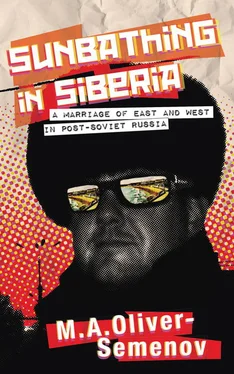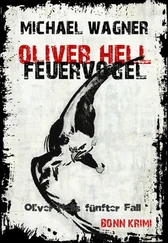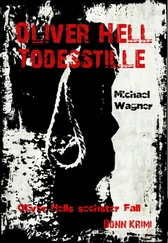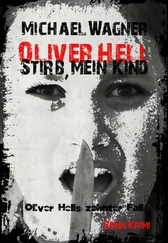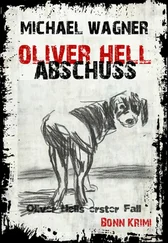Trams still operate throughout and even the old-fashioned second-hand buses from neighbouring countries add to the city’s charm, though the traffic was the most obvious example of the Russian class divide. Oligarchs and officials drove around in large off-road vehicles, silver Japanese Mitsubishi 4x4s or American Humvees while regular people drove cheap Japanese saloons or old Russian cars. I saw an inordinate number of Ladas from the 1970s and 1980s and an occasional sleek vintage car from the 1950s. The majority of vehicles I saw were old, and many had parts missing from small accidents, which are quite common as most people drive like nutcases.
Boris’s car was quite old, and Nataliya Petrovna was forever nagging him to buy a new one because it seemed every other day he had to spend an afternoon with his car in the garage because it failed to start. Although this would have driven me crazy, Boris didn’t seem to mind. He has an attitude of ‘If it’s not broken, why replace it?’ Which I could understand, but at the same time, his car may not have been broken, but it was on its last legs. Materialism and capitalism are very much looked down upon, not only within my Siberian family, but throughout Krasnoyarsk. Having spoken with some of Nastya’s friends, the general view is that ‘the soul is more important than money.’ Dima, who is aware that I am writing this told me that he hopes it brings me success, ‘Not lots of money, but happiness, and a little money.’
I was surprised by the number of people I spoke to who lamented the dissolution of the USSR. One person even attributed its loss, not to the cold war but to Coca-Cola. Although Pepsi was available in the Soviet Union from 1979, Coca-Cola only became available there after the cold war in 1992. This person’s theory was that the cost of the cold war resulted in massive economic decline, leading to extreme poverty. This, coupled with the broadcasting of American television programmes in which seemingly well-off people lived happily and drank Coca-Cola, seduced many of the people in the smaller countries that formed the Soviet Union into thinking they would be better off in a capitalist state; which of course proved not to be the case. Since the dissolution of the Soviet Union, the economies of many former Soviet countries, such as Georgia, and Tajikistan are worse than in 1991, while other former Soviet countries are only marginally improved. Coca-Cola therefore is seen here as a seductive mistress who promises gold but only provides fool’s gold.
When I first arrived in Krasnoyarsk, I felt some sort of culture shock, and while being unable to buy welsh cakes, laverbread, or (real) sausages and (real) mashed potato in gravy, I took to buying Coca-Cola, even though I do not drink it normally. I had to keep it a secret however as whenever Boris saw a bottle of it around, he would look at me disapprovingly, say the words ‘Cola, bad’, and promptly pour it down the toilet. Although Boris wasn’t a fan of the Soviets he still lives in the way he had to during their rule. Everything is recycled, including every plastic bottle, scraps of clothing and discarded bits of wood. This is a stark contrast to how the younger Russian generations live. Influenced by capitalist values, the younger people I met liked to have new things, and didn’t mind replacing things when they weren’t broken. This juxtaposition in attitudes is no clearer than in the city centre, where babushkas live in old wooden buildings that are sandwiched in between contemporary apartment buildings.
At the very centre of the city stands an unfinished, twenty-four storey tower block, the unofficial symbol of Krasnoyarsk. Begun in 1985, the tower was originally constructed to house new businesses, as if Russia somehow knew the transition to capitalism was inevitable. With the subsequent dissolution of the Soviet Union, the tower was abandoned. In the decades since then it has changed hands many times but has never been completed. Today it stands a hollow shell of concrete legs, half glazed with tinted panels. It is a constant reminder of one of the worst recessions Russia has known, and perfectly symbolises the current economic and political climate here. Locked in perpetual recovery, forever unfinished, the tower represents the ever present conflict between capitalist and communist ideals. Construction of the tower block began just before perestroika, the political movement for reformation within the communist party during the 1980s, spearheaded by Mikhail Gorbachev. This was also the period in which Gorbachev sought to introduce glasnost, a policy that called for increased openness and transparency in government institutions. With the building constantly open to the elements while under permanent reconstruction, it seems to perfectly encapsulate Gorbachev’s political ideals, though I don’t think a half-complete tower was exactly what he had in mind when planning Russia’s reform.
The vast expanse of the Yenisei River makes Krasnoyarsk one of the most pleasant places in the entire world, and even though the city itself is huge, because of all the greenery throughout the suburbs and the centre, and a constant view of the mountains, it always feels to me that I am in a small town. It’s not just the old Stalinist architecture, the classical music in the street, the river, the outstanding natural beauty, or the feeling of being miles from the capital and its pseudo capitalist ways; Krasnoyarsk would be nothing without its people.
Nastya told me that when I arrive in Moscow, to blend in well I should pull the meanest face I can and never smile: ‘No one smiles in Moscow’. People do tend to look either angry or completely miserable. Before I visited Siberia, my view of Russians came from clichés in films and was that they were mostly crazy, devious, calculating, treacherous people who hated the West, and were likely to be used as spies if they ever went to the UK or America. I suppose some people may be. You get crazy devious people wherever you go, but I have never met any in Moscow or Siberia. In fact, I am ashamed now to even think of my Hollywood-instilled notion of Russians. The people I have spoken to in Moscow were kind and open, and the people of Krasnoyarsk even more so. I tend to think of it in terms of the London/Cardiff difference. I have met many foreign travellers in Cardiff, most of whom preferred the people of Wales – Cardiff in particular – to the people of London and England. Not to say they thought the English unkind, just slightly more abrasive than the Welsh.
Siberian people are a world away from the Moscow-dwelling Muscovites. For a start, they smile more often. It’s not uncommon to be invited to dinner and be presented with half a dozen courses of meat dishes and vegetables, and to be given some for the way home. Even if you visit someone very briefly they usually put an array of nibbles on the table for you to dip into. They care about other people’s wellbeing, as if everyone were distantly related. I have my own theory that this is implanted by two major factors. The first factor is that most Siberian people are poor in monetary terms. Those I have met have little compared to Western standards, and therefore there is an attitude of ‘We are all in it together. So why not share’.
The second factor that informs my theory is that Krasnoyarsk is zek country. Krasnoyarsk housed a large number of Gulags – the enforced labour camps of the Stalin era from the 1930s to the 1950s. When the prisoners, known as zeks, were released (if they managed to survive), they couldn’t always obtain resident permits for the towns and cities they once lived in and so became residents of Siberia. Not only that but once a prisoner was released, after suffering hard labour in 40° C summers and -40° C winters, they were probably in no state to travel far, and didn’t feel they could always be understood by Russians who had not been enslaved themselves. This was something Aleksandr Solzhenitsyn touched on in The Gulag Archipelago . According to Solzhenitsyn, there was an understanding between zeks that could not be penetrated or understood by outsiders. This train of thought seems to be apparent even today. The people of Krasnoyarsk and its neighbouring cities have a precious and very rare sense of community, based on hardship, which they know most Westerners cannot fathom. This is something akin to the sense of community I know exists in Ely, Cardiff. However, that community is largely constructed of working class people, some of whom receive state-funded benefits (like my family did). These benefits are seen as a luxury among Siberians, although they do have a slightly less generous welfare system of their own. Having been rescued from drowning myself by Jobseeker’s Allowance, even though I hated doing it, and there was a stigma attached to it, I am ever thankful that Britain is still a welfare state. It’s a terrible thing that this is currently under attack from the Tory government; if I hadn’t been able to float on JSA for a short period between jobs I may have perished, due to a lack of survival skills and an obvious lack of ability and space to grow my own food.
Читать дальше
